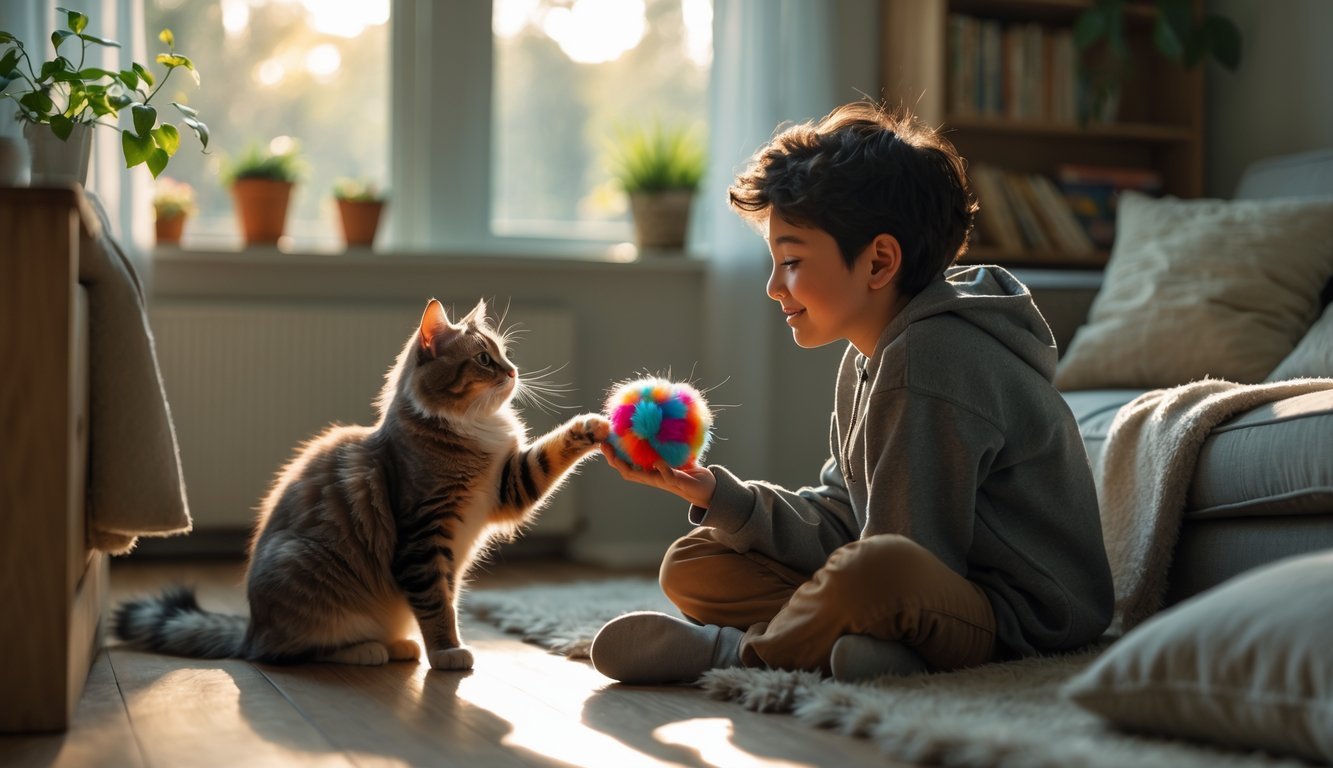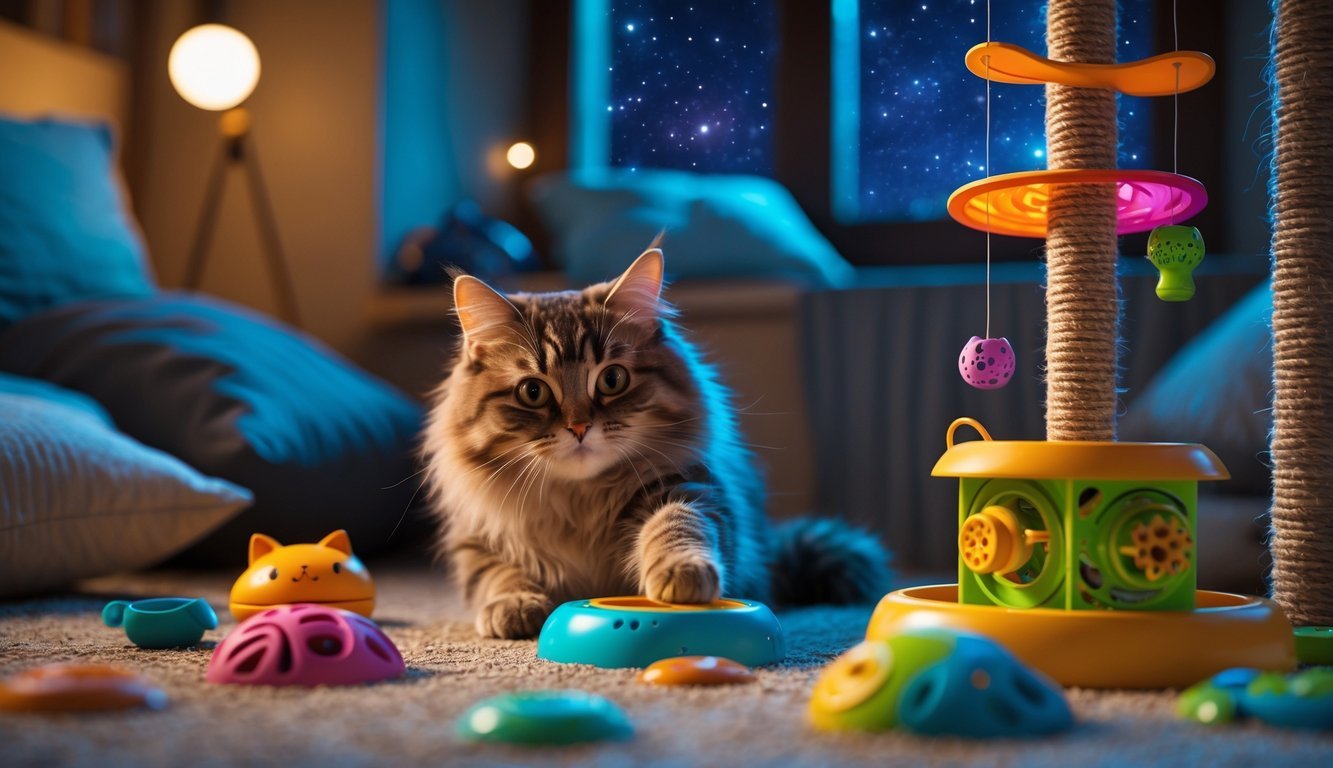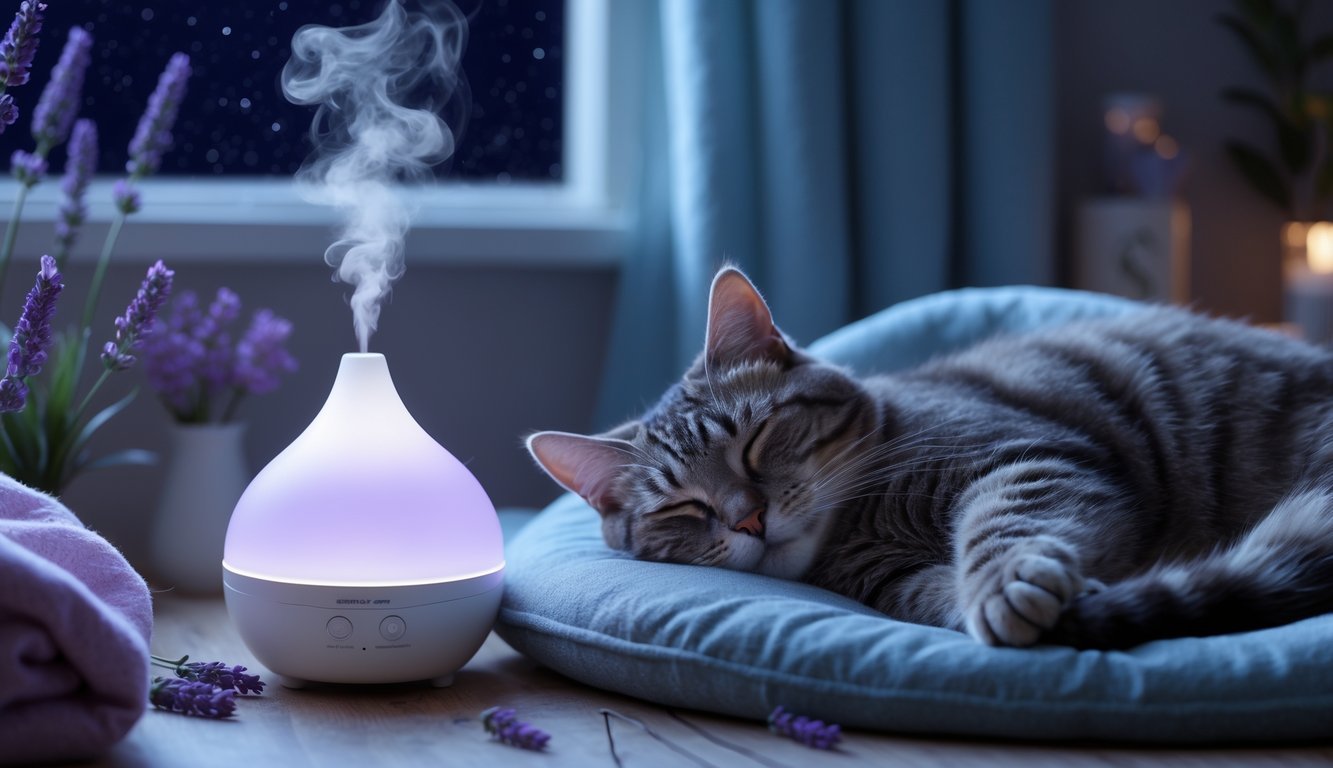PsychNewsDaily Publishers
100 Summit Drive
Burlington, MA, 01803
Telephone: (320) 349-2484
PsychNewsDaily Publishers
100 Summit Drive
Burlington, MA, 01803
Telephone: (320) 349-2484
Cats meow at night due to hunger, loneliness, boredom, attention-seeking, desire to go outside, cognitive dysfunction, health issues, disrupted routines, and stress or anxiety.

If your cat keeps you awake with constant meowing at night, you’re definitely not alone. Plenty of cats get chatty after dark, and it can leave you guessing what’s going on in their little heads.
Figuring out why your cat meows at night is the first step to getting better rest for both of you.
Nighttime meowing can come from all sorts of things—maybe your cat wants food, playtime, or is dealing with stress or health issues. If you get to the root of the behavior and try a few changes, you might just reclaim your sleep.

Sometimes cats meow at night because they’re hungry. Cats often prefer lots of small meals over one big one, and if they go too long without food, they’ll wake you up to let you know.
Try offering your cat a small meal before bedtime. That extra snack in the evening can help them settle down and sleep instead of pacing and calling for breakfast at 4 a.m.
Puzzle feeders and slow feeders can keep your cat busy and make them work for their food, which taps into their hunting instincts. By the time they finish, they’re usually ready to nap.
If the early morning meows keep coming, a timed feeder might help. It releases food at set times, so your cat learns to wait for it instead of bugging you. Keeping feeding times consistent helps your cat adjust, too.

Sometimes your cat just feels lonely at night and wants your company. Cats might act aloof, but they’re social creatures and often crave attention, especially after you’ve been gone all day.
Try adding more playtime during the day—especially interactive play with toys that mimic prey. Feather wands, little balls, anything that gets them moving and thinking works wonders.
Cats thrive on routine. Regular play sessions let them know when to expect your attention, which can cut down on nighttime meowing.
Enrichment helps, too. Puzzle feeders, climbing trees, or a window perch with a good view can keep your cat entertained when you’re not around.
When you give your cat more attention and stimulation during the day, they might just let you sleep at night.

Bored cats get noisy, especially at night. If your cat doesn’t get enough stimulation, they might look for excitement when you’re trying to sleep.
Interactive toys—like wand toys, balls, or even battery-powered gadgets—keep your cat active and mentally engaged. Swap out toys every few days to keep things interesting.
Puzzle feeders are great, too. They make your cat “hunt” for treats, which slows down eating and burns off some energy.
Leave a few toys out before bed. Sometimes that’s all it takes to keep your cat busy and less interested in waking you up.

Sometimes your cat meows just to get a reaction from you. Even if you scold them or talk back, you’re still giving them attention—and cats are quick learners.
If you always respond, your cat figures out that meowing works. Instead, try ignoring the noise at night. It’s tough, but if you’re consistent, your cat will eventually stop.
During the day, reward your cat when they’re calm and quiet. Offer affection or treats when they’re being good so they learn that silence pays off.
Sticking to your plan matters. If you give in some nights and not others, your cat might just double down on the meowing.

Curious cats often meow at night because they want to explore outside. The world looks different after dark, and your cat wants in on the action.
If letting your cat roam isn’t safe, try a “catio” or outdoor enclosure. These let your cat enjoy fresh air and new smells without the dangers of the outside world.
A window perch is a simple fix, too. Put it near a secure window so your cat can watch birds, bugs, or just the night sky.
Some cats enjoy short walks with a harness and leash. It’s a safe way to let them explore and burn off energy.
Giving your cat a safe way to connect with the outdoors can calm their urge to meow at night.

Older cats sometimes get confused or restless at night. Cognitive dysfunction—kind of like dementia in people—can make them meow more after dark.
You might see your cat wandering, acting lost, or waking at odd hours. These changes can lead to a lot of noise at night.
If you think this is happening, talk to your vet. They can check for other health problems and help you figure out what’s going on.
Your vet might suggest medication, diet tweaks, or changes to your cat’s environment. Keeping a steady routine and using night lights can also help older cats feel more secure.

Sometimes a cat meows at night because they’re not feeling well. Cats hide pain during the day, so nighttime restlessness might be your first clue.
Watch for changes in eating, bathroom habits, or energy. Even small shifts can mean something’s up.
Book a checkup with your vet if you notice anything off. They’ll check for things like dental pain, thyroid issues, or urinary problems.
Regular vet visits help you catch health problems early, before they get serious. If your cat’s meowing comes with other changes, don’t wait—get them checked out.

Cats really like routine. If you feed or play with your cat at random times, they might get anxious and start meowing at night to get your attention.
Stick to regular meal times. When your cat knows when to expect food, they’re less likely to beg at night.
Playtime matters, too. Play with your cat at the same times each day to help them burn off energy before bed.
A simple routine that includes meals, play, and quiet time can make your cat feel secure—and help you both get more sleep.

Cats aren’t truly nocturnal—they’re crepuscular, which means they’re most active at dawn and dusk. Their wild ancestors hunted when small prey was out, and that instinct sticks around.
If your cat has leftover energy from those peak hours, they might carry it into the night and start meowing.
Try scheduling play during the early morning and evening. Use toys that mimic prey, like feather wands or little plush mice, to really get them moving.
When you match your cat’s natural rhythm, they’re more likely to settle down and sleep when you do.

Stress or anxiety can make your cat meow at night. Maybe there’s been a change at home, a new pet, or just some loud noises that have them on edge.
Calming sprays or diffusers can help. These release pheromones or soothing scents that make cats feel safe. A lot of people find they help with anxiety-related meowing.
Sprays work well for specific spots—like bedding or carriers. Diffusers are better for calming a whole room.
Pair calming products with a steady routine and a peaceful environment. That combo can help your cat relax and might finally give you some quiet nights.

Your cat’s late-night meowing usually connects to their natural sleep cycles, how they communicate, and changes in their environment. If you pay attention to these things, you’ll get a better idea of why your cat gets so vocal after dark—and maybe, just maybe, you’ll find some peace and quiet.
Cats are crepuscular, so they get bursts of energy at dawn and dusk. Instead of sleeping all night like we do, they nap in short spurts whenever they feel like it.
That’s probably why your cat seems to come alive just as you’re ready to go to bed. Kittens and younger cats especially turn up the energy at night.
They’ll run, play, or meow to burn off whatever’s left from the day. Older cats sometimes stick with this schedule, but they usually rest more during daylight hours.
You can try shifting your cat’s activity cycle to help everyone sleep better. Give them some interactive playtime in the evening, then feed them.
This routine often helps them settle down for a longer rest while you sleep.
Cats mostly meow to talk to us, not to each other. When your cat meows at night, they might want food, attention, or just some company.
Some cats meow just because they know it’ll get you to respond. It’s worth thinking of nighttime meowing as communication, not just background noise.
For example:
If your cat suddenly gets more vocal at night, notice it. Changes like this can signal health issues, pain, thyroid problems, or cognitive decline, especially in older cats.
Your cat’s environment really affects how much they meow at night. If they get bored or don’t have enough to do, they might vocalize just for something to do.
No toys, scratching posts, or places to climb? That can make them restless.
Even small changes at home—like rearranging furniture, adding new pets, or shifting feeding times—can make your cat noisier. Stress often shows up as nighttime meowing.
Noise outside matters too. If your cat sits by the window and cries, they might hear or smell something you don’t.
Try blocking their view or using white noise to see if it helps.

If your cat keeps meowing at night, even after you’ve changed things at home, it could mean there’s a bigger issue. Pay attention to patterns, body language, and other symptoms so you know when it’s time to reach out for expert help.
Sometimes, excessive meowing means something’s wrong medically. Cats might get vocal if they’re in pain, feel hungry even after eating, or get restless because of thyroid or kidney problems.
Older cats sometimes meow more at night due to cognitive decline.
Look for other changes, not just meowing. Red flags include:
If you spot any of these signs, your cat probably isn’t just bored or seeking attention. They might be telling you something’s wrong. Acting quickly can help prevent things from getting worse.
If you notice your cat acting strangely or showing symptoms that just won’t go away, go ahead and book a vet appointment. Your veterinarian will run tests to look for things like hyperthyroidism, kidney disease, or dental pain.
They’ll help you figure out if a medical issue is behind the behavior, instead of just guessing it’s something behavioral.
When your vet says your cat’s healthy but the meowing won’t stop, reach out to a certified behaviorist. They might recommend enrichment activities, structured playtime, or changes to your cat’s environment to lower stress and help your cat stay busy at night.
Getting professional advice means you have a plan, not just trial and error. That way, you can support your cat and maybe even get a better night’s sleep yourself.